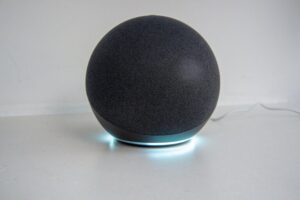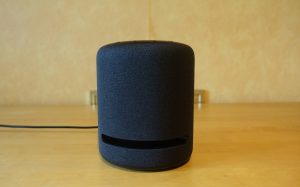Introduction
There are numerous smart speakers to choose from with efforts from Apple, Amazon, Google and Sonos offering plenty of choice in the market.
Smart speakers offer the ability to quiz voice assistants such as Alexa, Siri or Google Assistant about the weather, reminders for what you need to do, integration with other smart products and much more. They’re designed to be helpful, feeding you with relevant info to help you get on with what you need to do.
Each speaker generally belongs to its own ecosystem, and that’ll informs which products can work with it so it pays to know what speaker does what, and whether it fits into an existing set-up. With multi-room functionality, you can daisy chain multiple speakers within that ecosystem to create a whole house full of sound.
Here to make sure you make a smart decision, we’ve created this guide detailing the best smart speakers we’ve reviewed that are still on the market.
How we test
We play a lot of music, and we play it loud. We make sure that the smart features actually work, as why else would you buy it?
We test functionality with all the listed smart speakers, which means we regularly have conversations with the likes of Alexa, Google Assistant and Siri. How responsive are they? And are the features wide-ranging or limited in scope? We take all of this into account.
Of course, it always comes back to the music. Speakers are tested by reviewers who have a love of music, a knowledge of sound quality, as well as a context of the market. We’ll listen to smart speakers alongside similarly priced rivals, so when we recommend a particular model, it’s among the best you can buy for the money.
Obviously, we know not everyone has the same taste in music, so we won’t only test with the same perfectly mastered album, but with a variety of genres and file qualities, from MP3 to Hi-Res FLAC.
 Lorem Ipsum
Lorem Ipsum
- Improved sound
- Same price as the previous model
- Zigbee hub
- Looks fantastic
- Zigbee hub not compatible with all devices
 Lorem Ipsum
Lorem Ipsum
- Looks fantastic
- New controls are easier to reach
- Forward-firing speaker is clearer
- Low power mode has big restrictions
- Not ideal for lots of music
 Lorem Ipsum
Lorem Ipsum
- Weighty bass and big sound
- Alexa is terrific
- Dolby Atmos 3D
- Synergy with other Echo/Fire TV products
- Good value for the price
- Not as nuanced in the midrange or treble
- Bass can be overpowering
- Weighs a tonne
 Lorem Ipsum
Lorem Ipsum
- Excellent audio quality
- Well priced
- Comparatively small
- Apple-centric
- No audio inputs
- Captive power cable
 Lorem Ipsum
Lorem Ipsum
- Extravagant design
- Big room-filling sound
- Google Assistant smarts
- Plenty of app customisation
- Extravagant price
- Compromised Tidal Masters performance with Chromecast
- Not the most dynamic performance
 Lorem Ipsum
Lorem Ipsum
- Big, energetic sound
- Distinctive looks
- Plenty of connectivity options
- Small soundstage
- Not the most nuanced of performers
 Lorem Ipsum
Lorem Ipsum
- Excellent combination of Wi-Fi and smart speaker
- Great Wi-Fi performance
- High-quality audio
- Alexa has limitations on this system
Amazon Echo (4th Generation)
Best-value smart speaker for music
Pros
- Improved sound
- Same price as the previous model
- Zigbee hub
- Looks fantastic
Cons
- Zigbee hub not compatible with all devices
The 2020 Amazon Echo (4th Generation) isn’t just an iterative update. It features a new design, better audio and an integrated Zigbee smart home hub. Impressively, the new model costs the same as the old one.
With a new, funky spherical design, this Echo finally looks as though it’s been designed to sit in your home. With a bit more room inside, Amazon has managed to squeeze in an extra tweeter for two 0.8in tweeters and a 3in woofer. It gives audio that little boost and makes the Echo (4th Generation) a decent choice for music: you have to spend considerably more to get better audio.
This model also has the Zigbee hub, which used to command a £50 premium for the Plus model. It lets you connect some devices directly to the Echo without using a hub, such as Philips Hue bulbs. Not all Zigbee devices are compatible and you sometimes get fewer features, but this hub is there if you want it.
Pound-for-pound, then, the Amazon Echo (4th Generation) is the best smart speaker that you can get.
Reviewer: David Ludlow
Full Review: Amazon Echo (4th Gen)
Sonos One (Gen 2)
Smarts and great sound
Pros
- Great sound
- Small and convenient
- Proper Alexa integration
- Supports Google Assistant
Cons
- Alexa not fully compatible with Spotify at launch
The One slots neatly into an existing Sonos set up, offering multi-room capabilities and support for voice assistants such as Alexa and Google Assistant.
Diminutive in size but big in sound, the One generates a full-range sound without missing a beat. If you’re after a discreet unit that will fit easily into any room, one that offers all the smarts without scrimping on audio quality, then the Sonos One is the full package.
Reviewer: Ced Yuen
Full review: Sonos One
Amazon Echo Studio
The best-sounding Echo speaker
Pros
- Weighty bass and big sound
- Alexa is terrific
- Dolby Atmos 3D
- Synergy with other Echo/Fire TV products
- Good value for the price
Cons
- Not as nuanced in the midrange or treble
- Bass can be overpowering
- Weighs a tonne
The Echo Studio can play Dolby Atmos music and Hi-Res Audio. The focus on a premium sound experience at an affordable price makes it the best-sounding Echo speaker yet – but it isn’t flawless.
For one, there isn’t a huge amount of 3D audio for the Echo Studio to take advantage of, nor does all of it work well in 3D. Factor in its bassy sound and the Echo Studio can sound overcooked. But the Dolby Atmos 3D does work, and the number of features and versatility it offers (you can use it as a TV speaker) make for a good speaker.
Reviewer: Kob Monney
Full Review: Amazon Echo Studio
Amazon Echo Dot (4th Generation)
A cooler, better-sounding speaker
Pros
- Looks fantastic
- New controls are easier to reach
- Forward-firing speaker is clearer
Cons
- Low power mode has big restrictions
- Not ideal for lots of music
Amazon has gone all spherical on us, with the new Echo Dot (4th Gen) like a smaller version of the big Echo. The new design is lovely and a step up from the old hockey-puck design of the previous model.
The new design puts the controls on the top, where they’re both easier to reach for but blend better into the smart speaker’s design.
Thanks to extra space inside, Amazon has managed to point the 1.6-inch speaker forwards, rather than upwards. Although this speaker is the same size as the prior model, the 4th gen Echo Dot is clearer and louder. It’s great for voice responses or podcasts, and you can listen to the occasional music track, but it’s still not as good as a traditional music speaker.
Spend £10 more and you can get the Amazon Echo Dot with Clock (4th Generation), which sticks an LCD screen into the front to show you the time, making it a great bedside companion. Otherwise, the Clock and Dot models are the same.
If you want a well-priced smart speaker predominantly for smart home control, this is the one to buy.
Reviewer: David Ludlow
Full Review: Amazon Echo Dot (4th Gen)
B&O Beosound Balance
An extravagant speaker
Pros
- Extravagant design
- Big room-filling sound
- Google Assistant smarts
- Plenty of app customisation
Cons
- Extravagant price
- Compromised Tidal Masters performance with Chromecast
- Not the most dynamic performance
The Beosound Balance is another ode to Scandinavian design; minimalist, attractive and quietly extravagant.
The look has been laid on by the gurus of London-based Layer design, meaning it not only looks good but feels nice to touch. It offers a big room-filling sound that can go pretty loud, as well as plenty of clarity and definition to render your music library in a convincing manner.
It’s expensive – affordable doesn’t appear to be in B&O’s dictionary – but if you can afford this marriage of design and sound, there’s much to like with the Beosound Balance.
Reviewer: Kob Monney
Full Review: B&O Beosound Balance
Apple HomePod
An Apple-focused speaker to a fault
Pros
- Excellent audio quality
- Well priced
- Comparatively small
Cons
- Apple-centric
- No audio inputs
- Captive power cable
If you’re fully immersed in the iOS ecosystem and value great audio then the HomePod is second to none. It’s less expensive than it was before, but it’s Apple-centric approach is a stumbling block. To add to that, Siri is relatively un-smart and while HomeKit is pretty good, it suffers from a lack of support.
Nevertheless, it’s the best-sounding smart speaker out there, with a warm, expansive sound that’s clear as well as revealing plenty of detail. This is one for Apple lovers.
Reviewer: David Ludlow
Full Review: Apple HomePod
Google Nest Audio
The best Google Assistant speaker yet
Pros
- Improved sound
- Discrete design
- Easy setup
Cons
- Buggy
The Nest Audio takes over from Google Home sitting between the dinky Nest Mini and enormous Home Max.
As smart speakers go it’s one of the more discrete looking, featuring an unassuming woven body that’s made out of 70% recycled plastic. It has the same smarts as the Nest Mini, and the tech makes it quick and easy to create multi-room setups with other Google speakers. It’s also compatible with third party products from big-name brands including Philips Hue and TP-Link.
For those that want an actual speaker, then the Nest Audio is fairly decent sounding with its sizable 75mm woofer and 19 mm tweeter. The combo makes it one of the loudest smart speakers at its size, and an ideal choice for people locked into Google ecosystem.
Marshall Uxbridge Voice
Compact size, big sound
Pros
- Big, energetic sound
- Distinctive looks
- Plenty of connectivity options
Cons
- Small soundstage
- Not the most nuanced of performers
The Uxbridge is another laudable speaker from the iconic audio brand, that like other entries in Marshall’s speaker range, produces a prodigious sound from its small frame.
There are better-sounding alternatives around (just look higher up on this list), but if energy and bass is what you’re looking for in a speaker that doesn’t take up much space, the Uxbridge ought to be considered for the shopping list. More nuanced audio and features can be had from other speakers, but like the rest of Marshall speaker lineage, it offers plenty of fun.
Reviewer: Kob Monney
Full Review: Marshall Uxbridge Voice
Netgear Orbi Voice
Wi-Fi extender, Alexa and speaker in one
Pros
- Excellent combination of Wi-Fi and smart speaker
- Great Wi-Fi performance
- High-quality audio
Cons
- Alexa has limitations on this system
The Netgear Orbi Voice is likely to be the unfamiliar unit in this list. It serves a dual purposes, with it mesh Wi-Fi technology extending Wi-Fi in the home, it also bundles Alexa voice control and a sound system by Harman Kardon.
All this works out to be a potent combination. The Orbi Voice is a speaker that’s easy to listen to, offers plenty of bass, and can fill a good-sized room with ease. The main issue with the Orbi Voice is one that’s out of its control: Amazon’s treatment of third-party devices means you can’t use Alexa to voice-call nor set up the unit within a group of speakers.
Reviewer: David Ludlow
Full Review: Netgear Orbi Voice
FAQs
You’ll find that Amazon Alexa and Google Assistant are the most commonly supported digital assistants on speakers. If you’re within the Apple ecosystem then Siri is the assistant of choice.
You could disable digital assistants through the speaker’s companion app if that’s supported. Many allow for the microphone to be turned off to disable the assistant.

